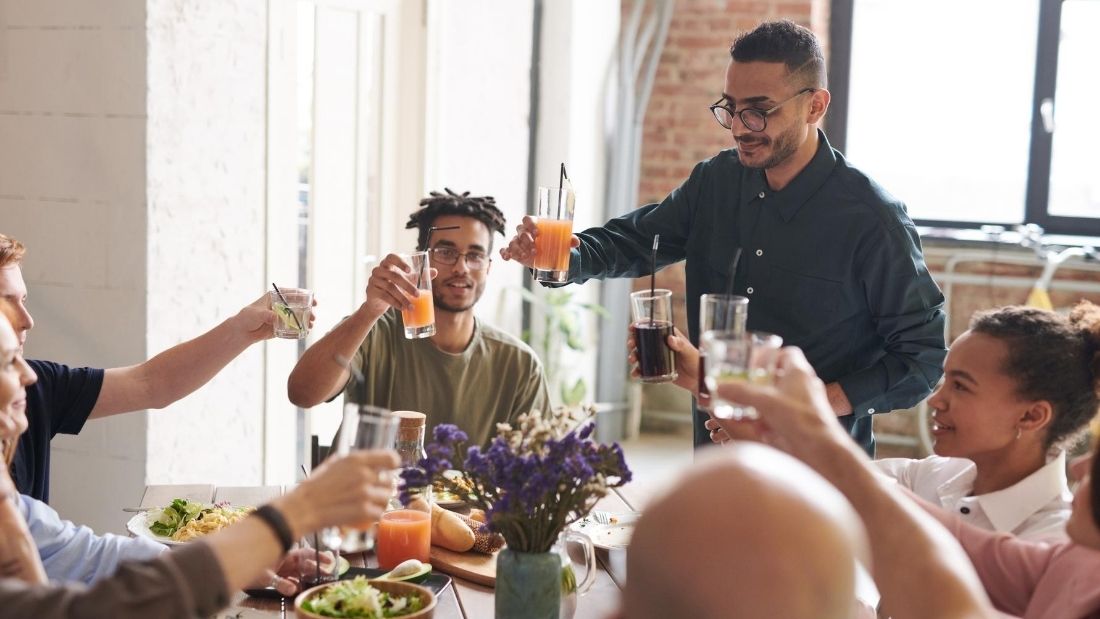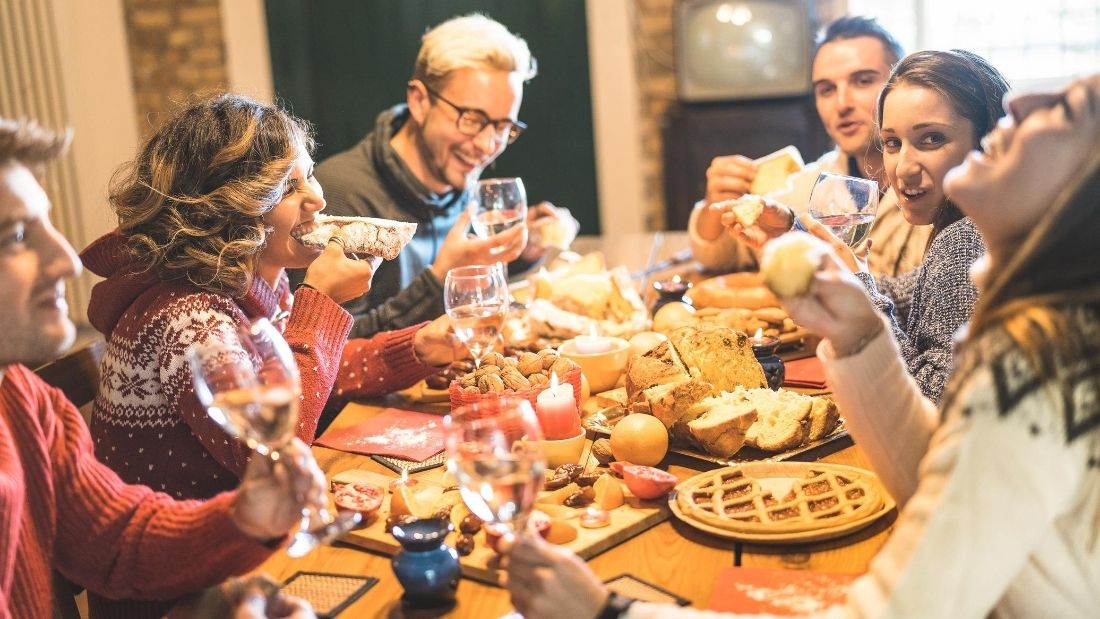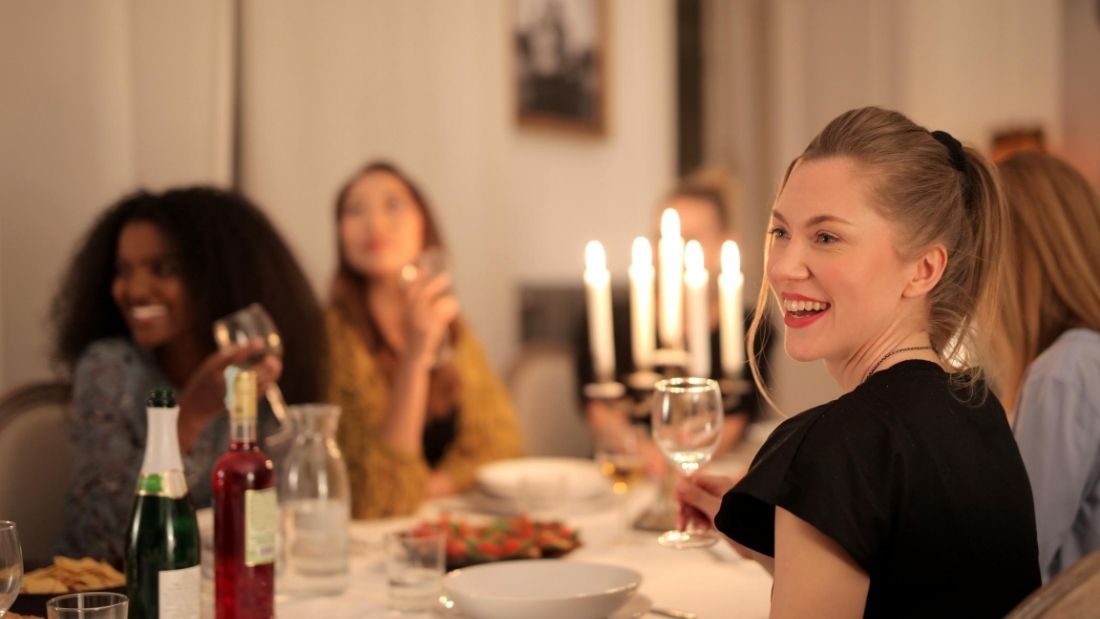Finding community

Choosing to go vegan will have some amazing, positive benefits to you, the planet and the animals. You will feel healthier and have more energy, you will reduce your impact on our fragile planet, and you will save the lives of countless animals.
This page is all about communicating this change with your friends and family. In general, most people find the process easy and are thrilled by how accepting (and excited!) their families are to cook new meals and see their loved ones happy. But it is also normal to have some reservations about the reaction you’ll get from those closest to you. All of this will fall into place and so for now, take it step by step and get to know the brilliant vegan community.
The vegan community is a wonderful place. It feels incredible to be surrounded by like minded people who share your values and beliefs. It’s also great to share food and get excited about new product launches together! No matter if you’re just starting out or have been vegan for a while now, the support of a community plays a key role in keeping you vegan and motivating you to help others.
The first step to build a sense of community is to find your local vegan group. This is typically done through social media, especially through Facebook, and is a great place to ask questions, share recipes, products and tips, and even have somewhere to offload!
Next, lookup vegan events such as festivals, drinks, potlucks and board game nights. You can usually find these through your local group but also check websites such as meetup.com and My Vegan Town. If there’s none in your area, be brave and post in the group asking if anyone would like to meetup. It can all start with a coffee or grabbing a bite to eat and before you know it, you’ve made a new group of friends!
Look on My Vegan Town for event listings: www.myvegantown.org.uk
If you find the thought of meeting new people daunting, take it easy and at your own pace. Try chatting to people online within the vegan group before taking the next step and attending an event. You can also ask the organiser if you can come along a little early to have some one-to-one time, if you find larger groups intimidating. This gives you some time to settle in and get to know someone before being introduced to the rest of the group. It’s also normal for people to attend with a friend the first time, whether they’re vegan or not — as long as they are respectful and understanding towards the group!

When you go vegan, you may be worried about what your friends and family might say. After all, they will still believe that eating meat is ‘normal, natural and necessary’ because of the way our society teaches us about food. It’s totally normal to worry about the change in dynamics with your friends and family, as so much of human relationships and socialisation are based around food sharing. The good news is, this will be temporary and over time, you will see friends and family trying vegan food and choosing to go vegan, which is amazing to watch!
Dr Melanie Joy has a whole book dedicated to this subject called ‘Beyond Beliefs: A Guide to Improving Relationships and Communication for Vegans, Vegetarians and Meat Eaters.’
Here are our top tips for addressing questions and concerns from friends and family, and how to encourage them to try veganism:
Find opportunities to share food where possible.
Food sharing is a huge part of our culture. There are loads of ‘accidentally vegan’ foods and recipes, meaning you can find common ground with your partner/family and get excited about mealtimes together!
Decide whether to discuss veganism around the dinner table.
Mealtimes should be a peaceful time where everyone feels relaxed and respected, so make a judgement on whether the mood is right to discuss veganism. If people are open and eager to hear about why you’re vegan or the food you’re eating, then go for it! But if you detect hostility, avoid commenting on their food and say you would rather talk about veganism afterwards.
Praise the small steps.
If your partner chooses a vegan option or picks you up some dairy-free ice-cream, let them know how much you appreciate it! Ask them what they think and encourage them to try more delicious foods!
Educate yourself.
By going vegan, you are unknowingly becoming an ambassador for veganism and so do your best to prepare responses to the most common arguments — like the ones on our Frequently Asked Questions! If you don’t know something, it’s better to say you’re not sure but you will find the information out, maybe you could even research it together?
Let the results speak for themselves!
When you go vegan, you’ll likely find that you feel healthier, have more energy, become more passionate about food and just feel better in general. Your partner/family will see these changes in you and — if they have your best interests at heart — will be happy for you.
Let them come to you.
It’s sometimes better to allow people to ask questions about veganism rather than bringing it up yourself. It can even be a small question about your food, or it might be asking why you’ve gone vegan. This shows that the person is ready to talk about it and may be much more receptive to your reasoning.
Have patience.
Most likely, it took you weeks, months, years to make the decision to go vegan. Try to understand that your friends and family aren’t at that stage yet, but it doesn’t mean they won’t ever be. It’s all about tone! You can say almost anything you like, so long as the tone is right! And humour works really well. But get the tone wrong – angry or defensive – the person you’re trying to influence will switch off.
The key message here is to lead by example with delicious foods, kind words of encouragement, a positive attitude and a healthier lifestyle. You’ll soon find that your partner/family are much more receptive to veganism.

Sometimes mealtimes can feel a bit daunting, for vegans and non-vegans alike! Your friends or family may not know how to adapt meals or may be reluctant to try new recipes. You may feel worried that the host won’t provide any vegan food. Here we provide some additional advice on how to prepare for mealtimes and make it as simple as possible. With some advance warning, most people are open and ready to cook vegan and try new things!
Discuss the eating arrangements in advance.
It’s important to know what to expect — is it a more formal event, a BBQ, or a potluck? It may also make the host feel more prepared if you talk to them beforehand and offer to help. You could lend them a cookbook, send over some delicious recipes from VRC or a copy of our recipe guides. Or if it’s a BBQ offer to bring the vegan sausages/burgers.
Contact the restaurant, cafe, or pub in advance.
If you’re eating out and it’s not immediately clear from the menu whether the restaurant has vegan options, contact them and ask. More often than not, chefs are happy to prepare or adapt vegan options.
Offer to bring a dish to non-vegan events.
Most people really like trying new food. In fact, the Viva! team has found that normally everyone is envious of the vegan options! It also helps demonstrate what you can eat, making it easier for friends and family to prepare vegan food at the next event.
Learn the easy swaps.
One of the best responses to ‘what do vegans eat?’ is to turn the question on its head and ask, ‘what do you eat?’ You can then demonstrate how many things are accidentally vegan and those which aren’t, can be easily swapped for a vegan alternative. They’ll soon realise that anything they can eat, you can eat vegan!
Judge the mood at the dinner table.
It may or may not not be a good idea to discuss veganism around the dinner table as it can be an emotionally charged subject. If the people involved want to talk about it then of course you can go with the flow if the mood is right but if you feel there’s aggression/irritation brewing, suggest a time later in the day.
Listen to others.
If you decide to talk to someone about veganism, it’s important to hear their story, giving them your full attention rather than waiting to tell them everything you know about veganism and why they should go vegan. Over-informing doesn’t usually go down well as people only have certain capacity to take on board new information or ideas. If you listen to their point of view, they should then be much more open to listening to yours.
Don’t be afraid to say no.
Let’s say you’ve been invited to dinner at a non-vegan restaurant, you’ve checked and the chef has said they can’t offer vegan options. There’s nothing wrong with relaying this information to your social group and offering an alternative restaurant.
Debrief with other vegans.
If you do have an upsetting dinner experience it’s important to talk about it afterwards to re-establish that sense of community.
Remember — the advice given here is intended for people who are struggling to communicate about veganism to their friends and family. In general, many people find the process easy and are thrilled by how accepting their families are. We wish you all the best in your vegan journey!




